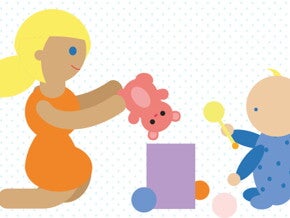
There are few sights more heartwarming than that of your blissfully sleeping baby. Whether it’s a nap after a busy, active morning, or nighttime sleep after his regular bedtime routine, this is his chance to rest his body and mind.
The link between sleep and speech
Sleep is so much more than downtime for babies. It plays a positive and critical role in your baby’s brain development and physical growth.
What you may find surprising is that recent research has linked early sleep patterns with vocabulary development when babies are older. The number of naps your baby takes in the daytime now, say experts, may have a positive impact on the number of words he speaks and understands when he is older.
How much sleep is enough?
All babies are unique, but at eight to 10 months, your baby will probably sleep for between nine and 12 hours a night. Unlike when he was first born, your baby may be sleeping through the night now, which means you feel more rested too. With all the activity your little one enjoys in the daytime, as well as the new skills he’s learning every day, it’s no surprise he’s ready for a good night’s sleep.
At this age, your baby needs around 15 to 16 hours of total sleep each day, including daytime naps and nighttime sleep. Your baby will likely be napping two to three times during the day, for varying amounts of time. Some babies will nap for 30 minutes and others for up to two hours. You may meet with some resistance from your baby at nap time. It may be that your baby simply does not want to be away from you, rather than that he isn’t tired.
Routine, routine, routine
Babies have been shown to sleep longer when there is an established bedtime routine. Perhaps the routine in your house starts at 7pm and includes a bath, a story or lullaby, and a kiss goodnight. Whatever you have become used to doing should be part of each night’s pre-sleep pattern.
Your baby is probably so familiar with his bedtime routine by now that he chooses the story or lullaby he prefers! Just as you did when he was younger, avoid giving him a bottle in his crib. By putting your baby down in his crib when he is drowsy but still awake, you have helped him learn how to fall asleep on his own. (Want more calming bedtime routine ideas? See 13 tips for sweet dreams.) All of these habits help your little one sleep through the night.
Most babies are able to roll over by this age—so even though you may put your little one in his crib on his back, you may find him lying on his stomach in the morning. He can decide if he wants to sleep on his back or tummy now.
Many babies will sleep through the night, but some may still wake several times. If he does wake in the night, it’s unlikely to be for a feeding at this age, so check other reasons first. The type of milk you give your baby in the day doesn’t affect how often he wakes at night. Research indicates that breastfed and formula-fed babies wake about the same number of times each night.
Sleep problems and solutions
- Separation anxiety If you are noticing some reluctance by your baby to be away from you, he may be starting to experience separation anxiety. One way to help is with a ‘transitional object’, such as a toy or piece of fabric, which can be safely left in his crib, until after he falls asleep. This can help him settle when he is away from you and can be one more step toward independence for him. Choose a soft, washable toy without sharp ends or small parts that could come loose (such as buttons) and check that it’s made from flame resistant/retardant fabrics.
- Inadequate sleep Lack of routine could be the reason for your baby not getting enough sleep. Late bedtimes, a television in your baby’s room, and not having a bedtime routine are all associated with shorter sleep times, according to recent research.
- Nightmares At eight to 10 months, your baby may start to have nightmares. These occur during dream—rapid eye movement (REM)—sleep and your baby may wake up crying and upset. Go in and comfort him, give him cuddles, and reassure him that you’re there and he’s safe.
Recognizing reasons for waking up
If your baby has been sleeping through the night and starts to wake up occasionally, don’t immediately offer a feeding. Instead, run through possible reasons for his waking up in your mind. After checking the obvious need for a diaper change, or being too hot/cold, ask yourself if he could be T.I.R.E.D:
T – Teething?
I – Ill (Does he have a cold? Or has he just had vaccinations?)
R – Routine disrupted (Has his usual bedtime routine changed?)
E – Extraordinary (Is something different tonight? Are you on vacation? Have you just moved to a new house?)
D – Dreams (Has he had a bad dream?)
If you suspect teething is the culprit, try using a cold washcloth on his gums to soothe them. If you think he woke up due to one of these other reasons, soothe and reassure him. Always consult your healthcare provider if your baby is showing any signs of illness.
Sources
Hirshkowitz M, Whiton K, Albert SM et al. National Sleep Foundation’s sleep time duration recommendations: methodology and results summary. Sleep Health 2015; 1(1):40-43.
Horvath K, Plunkett K. Frequent daytime naps predict vocabulary growth in early childhood. J Child Psychol Psychiatry 2016; 57(9):1008-17.
Tham EK, Schneider N, Broekman BF. Infant sleep and its relation with cognition and growth: a narrative review. Nat Sci Sleep 2017; 9:135-49.


















